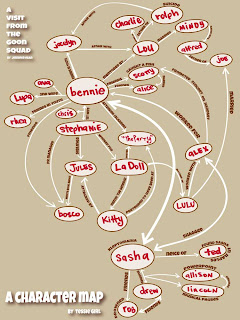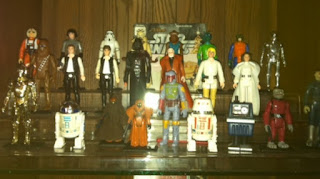A Million Voices Cried Out All At Once
Voice is the hardest thing to capture in fiction.
Every short story or novel has a voice, even if it's told in the third person. Often the 'voice' of that narrator, omniscient or not, will have a rhythm or cadence particular to the storyteller. Sometimes this is called 'style,' but for me, someone is always talking.
Junot Diaz has an excellent article on voice over the Huff Post this week. Ignore the comments - wow, did some of these people spill their barely bottled resentment all over themselves - and take in what he's saying. I always start with voice; character is voice. Character is story, so they go hand in hand and the failure in one will be the failure of both. To distinguish the voices of your characters, you have to hear them. You need to listen. It's been said a lot of times before and by better writers, but one of the best tools in your toolbox is eavesdropping. Dialogue benefits from this as well, so don't have your earbuds in when you're on the bus or train or standing in line at Starbucks. Hear what other people are saying, and how they say it.
Hear what they aren't saying.
As Diaz says in his article, people speak differently within different contexts. In a job interview, I will speak more professionally and assured than I will with my friends when we are out on Friday night interviewing beers. People also speak from experience. Every conversation people have is an iceberg. We see only the tip. Beneath the surface, a lifetime of resentment, disappointment, unrequited love or suppressed anger informs what two people say to each other, and how. A married couple avoids addressing the fact their marriage is falling apart, but their daily interaction stems from this unsaid conflict; planning dinner becomes a minor fight because last week they fought about what to do because there's nothing new to do. It's the same restaurant again and again, it's the same drive home and the same dull hour in front of the TV before they go to bed and he promised her once it would be different.
In my novel The Book of Elizabeth, two of the central characters - Queen Elizabeth I and Alice Vale, a 24 year-old housewife from Iowa - have a pretty unlikely conversation. The scene is critical because it crystalizes the question of the novel, and situates both Elizabeth and Alice in relation to it. This sets up the rest of the novel and the story still to come. My goal in their dialogue and in the scene was to let their obvious differences manifest through how they spoke, what they said, and ultimately, what they didn't.
What a character doesn't say informs their voice as much as what they do, and that can be experience or it can be their emotional state. If you're very nervous, you will trample over what you're trying to say and not sound yourself; in a novel, we will see this contrast with other conversations. In this scene, Elizabeth exacts a somewhat condescending manner of speech with someone she takes for a 'peasant.' Elizabeth's intelligence, station and self-appraisal inform what she says here and elsewhere, but with limited exception, you don't see her talk down to others this same way. Why does Elizabeth talk down to Alice? Is it because Elizabeth is simply a queen, and Alice a lowly subject? Some of that surely exists - for Elizabeth, it exists in every interaction save for a few - but mostly it stems from what Alice says. Alice alternately conveys a picture of the future that is both hostile to Elizabeth - 'I fear for your Des Moines' - and also incredibly enticing. Alice enjoys a freedom and an agency as a woman that Elizabeth simply never knew. And Alice is a woman of little means and no real education. It horrifies Elizabeth, and her reaction is to throw an elbow.
So, this is my little offering to the conversation of voice. There are many others, like Diaz's. Hear them all.
Every short story or novel has a voice, even if it's told in the third person. Often the 'voice' of that narrator, omniscient or not, will have a rhythm or cadence particular to the storyteller. Sometimes this is called 'style,' but for me, someone is always talking.
Junot Diaz has an excellent article on voice over the Huff Post this week. Ignore the comments - wow, did some of these people spill their barely bottled resentment all over themselves - and take in what he's saying. I always start with voice; character is voice. Character is story, so they go hand in hand and the failure in one will be the failure of both. To distinguish the voices of your characters, you have to hear them. You need to listen. It's been said a lot of times before and by better writers, but one of the best tools in your toolbox is eavesdropping. Dialogue benefits from this as well, so don't have your earbuds in when you're on the bus or train or standing in line at Starbucks. Hear what other people are saying, and how they say it.
Hear what they aren't saying.
As Diaz says in his article, people speak differently within different contexts. In a job interview, I will speak more professionally and assured than I will with my friends when we are out on Friday night interviewing beers. People also speak from experience. Every conversation people have is an iceberg. We see only the tip. Beneath the surface, a lifetime of resentment, disappointment, unrequited love or suppressed anger informs what two people say to each other, and how. A married couple avoids addressing the fact their marriage is falling apart, but their daily interaction stems from this unsaid conflict; planning dinner becomes a minor fight because last week they fought about what to do because there's nothing new to do. It's the same restaurant again and again, it's the same drive home and the same dull hour in front of the TV before they go to bed and he promised her once it would be different.
In my novel The Book of Elizabeth, two of the central characters - Queen Elizabeth I and Alice Vale, a 24 year-old housewife from Iowa - have a pretty unlikely conversation. The scene is critical because it crystalizes the question of the novel, and situates both Elizabeth and Alice in relation to it. This sets up the rest of the novel and the story still to come. My goal in their dialogue and in the scene was to let their obvious differences manifest through how they spoke, what they said, and ultimately, what they didn't.
What a character doesn't say informs their voice as much as what they do, and that can be experience or it can be their emotional state. If you're very nervous, you will trample over what you're trying to say and not sound yourself; in a novel, we will see this contrast with other conversations. In this scene, Elizabeth exacts a somewhat condescending manner of speech with someone she takes for a 'peasant.' Elizabeth's intelligence, station and self-appraisal inform what she says here and elsewhere, but with limited exception, you don't see her talk down to others this same way. Why does Elizabeth talk down to Alice? Is it because Elizabeth is simply a queen, and Alice a lowly subject? Some of that surely exists - for Elizabeth, it exists in every interaction save for a few - but mostly it stems from what Alice says. Alice alternately conveys a picture of the future that is both hostile to Elizabeth - 'I fear for your Des Moines' - and also incredibly enticing. Alice enjoys a freedom and an agency as a woman that Elizabeth simply never knew. And Alice is a woman of little means and no real education. It horrifies Elizabeth, and her reaction is to throw an elbow.
So, this is my little offering to the conversation of voice. There are many others, like Diaz's. Hear them all.


Comments